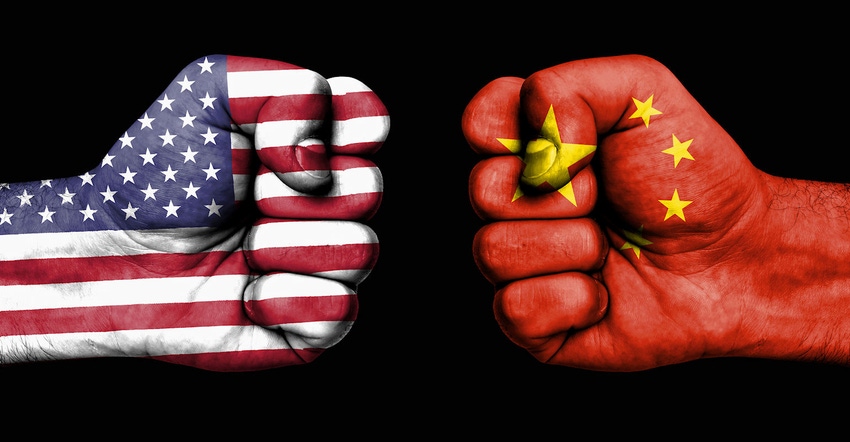
At the end of the week which was characterized by a tit-for-tat response between China and the United States on trade retaliations, it’s starting to look as though neither China or the United States will back down. The good news for farmers is that there still is time before the worst of the tariffs – such as the 25% tariff on soybeans, corn and beef – could go into effect.
In response to an additional $100 billion in tariffs that President Donald Trump asked the U.S. Trade Representative to examine based on farmers being targeted in China’s retaliation, a spokesman for China’s Ministry of Commerce, responded, “We don't want to fight, but we're not afraid of a trade war. The statement to the U.S. side that we will listen to its words.”
China says it isn't afraid of a trade war, but also knows it must feed its people. The No. 1 fear is political unrest, and Chinese consumers faced with food insecurity could do exactly that.
Under the U.S. plan, companies have until May 22 to object to China's proposed tariffs, and the U.S. government then has at least 180 days to decide whether to go ahead, providing ample time for negotiations.
Larry Kudlow, director of President Donald Trump’s National Economic Council, said the tariffs the U.S. proposed Tuesday will take a couple of months to finalize. “I doubt if there would be any concrete action for several months. We’ll see how that plays out," he said. "Nothing concrete has actually happened. These are proposals, but the message is clear: China has to stop these unfair and illegal trading violations.”
China announced that it has taken the first step in challenging the U.S. trade restrictions at the World Trade Organization; the implementation date of China’s tariffs depends on bilateral negotiations and when the U.S. intends to apply its own tariffs, according to Denise Bode, from Michael Best Strategies.
Kudlow added that the U.S. is going to WTO and said he’d be very surprised if there isn't a huge backing from other nations around the world joining the U.S. not only in tariff complaints but also in WTO complaints.
“Trump is putting his cards on the table. He’s standing up for this country but also standing up for better world trade,” Kudlow said.
Ian Sheldon, agricultural trade economist at Ohio State University, said the U.S. should back away from the range of tariffs it has proposed and instead go to WTO to figure out how to resolve these issues. “This is taking a sledge hammer to deal with this problem,” Sheldon said.
The reason the world has predominantly been able to prevent trade wars is because of the dispute process allowed under WTO.
U.S. farmers dealt with huge market blows after Wednesday’s news. The hope is that all of the cards are now on the table and that negotiations can come through with a win.
National Corn Growers Assn. chairman Wesley Spurlock said, “Our corn farmers have worked for decades to support fair and open trade practices, because we understand that trade is a two-way street. In today’s global economy, we know that we need to be competitive to grow and maintain our market share. Our farmers have done that, which is why agriculture has a positive trade balance."
Spurlock added, “We do have a window of opportunity to reach a mutually beneficial trade position with China until the time that tariffs are fully implemented. We need to be measured, professional and business-like in our approach to keeping the trade doors open with China. Equally important, we need the President to understand the implications these trade actions have for America’s farm families.”
“Trade wars are not good for anyone, and we urge President Trump and other negotiators to take a constructive approach in the ongoing negotiations,” National Sorghum Producers chairman and Nebraska farmer Don Bloss said.
It’s the constructive approach that is needed in what has become an escalated spat between farmers’ top export destination for many of its products.
About the Author(s)
You May Also Like






